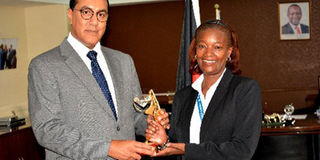Tourism players must lower prices to woo more visitors

Tourism Cabinet Secretary Najib Balala receives The International Diamond Prize for Excellence in Quality 2015 (Gold Category) Award from Tourism Finance Corporation (TFC) Managing Director Marianne Ndegwa Jordan awarded to the Corporation in Vienna, Austria. Mr Balala has been positively associated with the tourism industry, especially at the Coast, for a number of years. PHOTO | NATION MEDIA GROUP
What you need to know:
- Kenya has a large imbalance in its current account and spends much more on imports than it earns from exports and tourism.
- There is a need to systematically look at the whole sector bit by bit and see how it can work better and where necessary eliminate or reduce impediments.
- Mr Balala’s initiatives are a start but let us work through the whole system and that involves a lot of coordination and cooperation throughout all the layers of Government.
The measures announced by Tourism Cabinet Secretary Najib Balala to help restore the lacklustre fortunes of the sector are a welcome start.
It is worth noting that they emanated from an individual who has been positively associated with the tourism industry, especially at the Coast, for a number of years.
Considering the importance of tourism to the economy, both directly and indirectly, and the low troughs it has been through in recent years, there are three obvious questions that arise.
Will these measures be enough? What more can be done to give the industry a bigger helping hand?
Should we not be trying to think outside the box about how we can broaden and deepen the industry?
Let us dwell on the importance of tourism first.
One of the most critical things we must remind ourselves of is that Kenya has a large imbalance in its current account and spends much more on imports than it earns from exports and tourism.
This imbalance lessens when one includes earnings from Kenya being the regional hub and from diaspora remittances.
Nonetheless, we need to work hard at our economic drivers to improve performance and increase earnings.
Considering the relatively low occupancy levels and the spare capacity that there is for much of the year in the tourism industry, it makes sense to subject the sector to a makeover so that its volume, performance and contribution improve and increase.
Another factor to bear in mind is that a healthy tourism industry stimulates many other sectors of the economy, whether they be manufacturing or agriculture. It also stimulates the informal sector.
VERY EXPENSIVE
This consideration is key in several ways, not least in its utmost importance to providing more gainful opportunities for the millions of people coming onto the job market.
So, where do we go to now? There is a need to systematically look at the whole sector bit by bit and see how it can work better and where necessary eliminate or reduce impediments.
What do the industry players have problems with in running their businesses competently, profitably and, of course, legitimately?
Of course, there must be a regulatory framework but does it facilitate as much as it should or does it put in the way unwelcome and unnecessary handbrakes?
We need to remember at the forefront of our minds that tourism is, after all, a hotly competitive hospitality industry with arguably more supply than demand.
As much as possible, it must be a harmonious combination approach involving the Government, the private sector and, of course, the tourist.
There are certain critical benchmarks that must be addressed by all.
One of the main ones is price and cost. Kenya is still seen as a relatively costly destination.
As someone who is a fairly regular domestic tourist, I must say some of the prices offered are way beyond much of middle class Kenyans.
On a recent visit to Europe, I happened to look at what was on offer in the global tourism market, and it confirmed the impression that we are generally on the pricey side.
Mr Balala’s initiatives are a start but let us work through the whole system and that involves a lot of coordination and cooperation throughout all the layers of Government.
Industry players must consider lowering some of the rates they charge.
Not long ago I enquired on some of the Nairobi hotel rates and they were high and as interesting their occupancy levels were uninspiring.
The response to whether there was a resident rate was often met with a look as if I had asked a rude question.
DOMESTIC TOURISM
Another main area that needs improvement is overall capacity right from the airports to the hotel and beyond.
The last includes ease to get around the country as swiftly and inexpensively as possible.
Let me give one example. The launch of Jambojet in the domestic aviation market was one of the most revolutionary developments there has been.
For years, it had been an expensive affair to fly to some of our smaller airports or airstrip destinations.
Compare the costs of flying to Ukunda, for example, a few years ago to today.
In one fell swoop, flights to some of these destinations became more accessible to our growing middle class. That is a milestone.
In conjunction must come the improvement and broadening of infrastructure, ranging from all our airports and airstrips to roads and last but not least rail.
I recall one little airport, or should I say airstrip, where the luggage is collected from outside as the internal spaces do not allow for such volumes!
I have laid quite a lot of emphasis on domestic tourism.
This is not because international tourism should not be fostered.
It is because there is still a huge unmet potential in domestic tourism there that can very conveniently dovetail the international tourism market.
Mr Shaw is a Nairobi-based businessman. [email protected]





